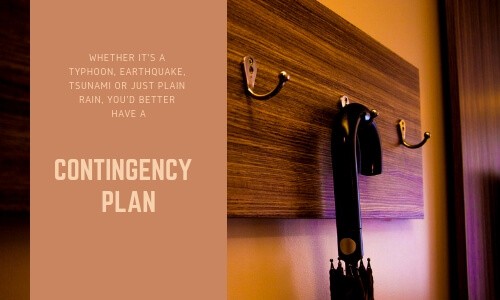
YouTube / iTunes / Spotify / Radio Public / Pocket Casts / Google Podcasts / Breaker / Overcast
Listen to ArtisanEnglish.jp posts & lesson intros here.
WotD: Contingency plan
Nothing stays the same.
The world is in a constant state of flux.
That’s why having a contingency plan for every possible situation is a good idea.
This year, we lost power for three days due to the most powerful typhoon to hit Japan in 25 years.
Luckily my wife and I had a gas cooking stove for just such an event.
We were able to boil water for coffee and cook our meals as we usually do.
That’s what a contingency plan is.
It’s an alternate plan designed for a possible change in future circumstances.
I’ve heard that some people in low-lying parts of Texas and Florida (Well, all of Florida is pretty much low-lying) have started building their houses on stilts.
Others are making a small mound on their property.
They are doing this with future flooding in mind.
Whether or not you believe in global warming doesn’t matter when your house is underwater.
Intelligent people have a contingency plan just in case the possible but highly unlikely occurs.
Backing up your computer to an external hard drive is a similar action.
If you have pictures or other vital data on your computer, you want to protect that in case you are hacked or something else happens.
The external hard drive is a good contingency plan, but backing up to the cloud is even better again.
We’re well into December now, and that means terrible road conditions.
As I’m Canadian, I was always taught to have supplies in my car in case I got stuck in the middle of nowhere.
A blanket, shovel, candles, and a few snacks could come in handy if a heavy snowfall causes you to be stuck on the highway.
You should never leave the safety of your car, so those supplies could end up being a lifesaving contingency plan.
Flesch-Kincaid Readability Test
This post is understandable by someone with at least an 8th-grade education (age 13 – 14).
On the Flesch-Kincaid reading-ease test, this post scores 69.
The easier a passage is to read, the higher the score on a scale of 0 – 100.

